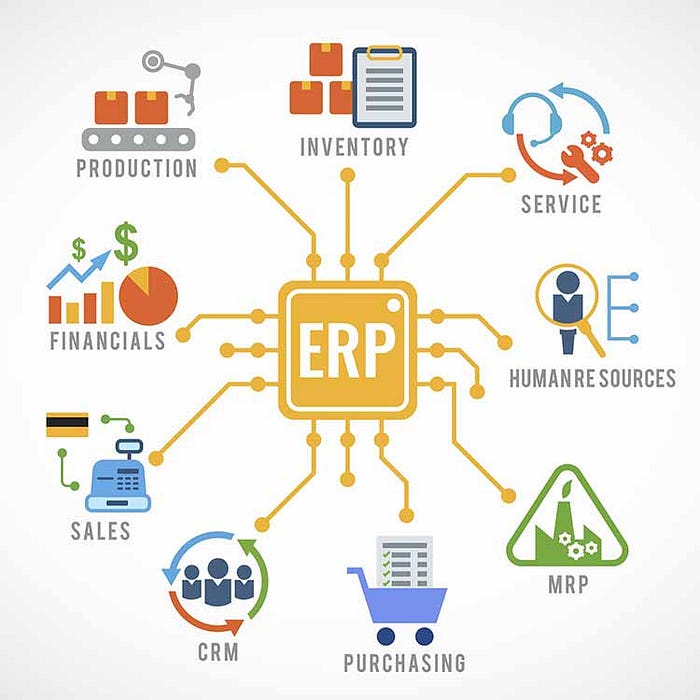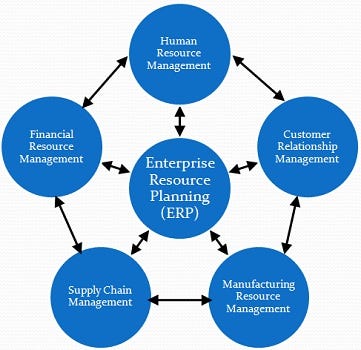What is Enterprise Resource Planning (ERP)?

Enterprise Resource Planning (ERP) is a software standard that integrates business processes across various departments such as human resource (HR), operational, finance, and other departments. Organizations that use ERP into their business along with information technology improve better functioning and provides quick changes to help an enterprise in the market. “It should be emphasized that ERP systems are an example of complex software, the implementation of which is often a difficult challenge for an enterprise. An enterprise using the ERP system is dependent on the system, so it is necessary to adjust it properly, at the stage of the system implementation, to the needs of the company.” Enterprise Resource Planning store and execute the information from different tasks including:
- Product planning development
- Sales and Marketing
- Financial Resources
- Inventory Management

Advantages of using Enterprise Resource Planning (ERP):
· It helps in optimizing business processes by providing accurate and in-time data and information.
· It eliminates unwanted threats, risks, improving customer response times, and unwanted used data.
· It improves performance and saves time in the organization by giving organizations better decision making.
Examples of Enterprise Resource Planning (ERP):
· Microsoft Dynamics: Microsoft markets Dynamics applications through a network of reselling partners who provide specialized services, it is an ERP and customer relationship management software applications.
· SAP ERP: SAP ERP is enterprise resource planning software developed by the German company SAP SE, which helps to incorporates the key business functions of an organization and it was last updated in 2006.
· ERP Next: ERP Next is a free and open-source integrated Enterprise Resource Planning software developed by Frappe Technologies and built on the MariaDB database system using a Python-based server-side framework.
As an IT manager, my company will use Enterprise Resource Planning (ERP) to integrate the various functions of an entity by getting the below benefits:
· It will endeavor in basic leadership process at all degrees of the executives, arranging future situations, and future arranging.
· It helps in increasing more noteworthy control and discernibly at all degrees of the executives, incorporates the supply chain with other administration levels.
· It computerizes most of the tasks and keeping up the accounts in order.
· It decreases production expenses and it will make our enterprise progressively profitable, improving performance, and get the most return of interest in the long haul.
At present, the progression of different kinds of data is significant. ERP frameworks are a unique sort of Integrated Information Management Systems (IIMS). Utilizing ERP frameworks, organizations can streamline the administration forms which, in the not so distant past, would be done on paper or through the phone. The proficient progression of data in a venture is critical from the business to the executive’s perspective. Without complete, dependable, and quick data on account, creation, buys, stock, and so forth., the organization can’t work appropriately. In this way, it is important to apply proper administration data frameworks. A case of such a framework is the Enterprise Resource Planning (ERP) application. ERP systems have become a tool in the IT industry, they help companies to streamline the processes along with management abilities which were difficult initially. They cover all integral areas of business such as resource management, reporting, documentation, human resources, accounting, and budgeting, etc. and help to make the process and functions efficiently.

Conclusion
Being a manager and deciding which technology would benefit the project instead of failing is an important discussion, everyone at any position in the firm want to be in the top of their game and want to bring in more success to the project, so considering ERP software for the project is a good investment as it has several benefits such as –
1. It is cost-effective, as once you buy this software it will last at least five years or more.
2. This decision should be taken into consideration along with the IT department as they can help with technical considerations of the project.
3. The system should be managed by people proficient with the system and should use to the maximum utilization as it is a better approach for success.
4. Before buying the software, it is a good approach to use the trial version to see if the software fits into the project structure, and is it benefiting the team and work. Such questions need to be asked before jumping into this otherwise it would lead to inevitable failure.
